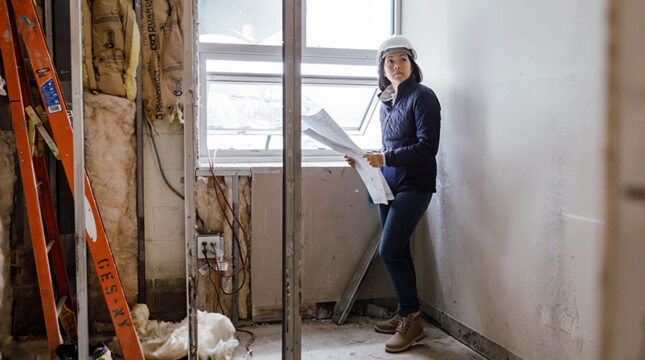Figuring out your coverage needs
To begin with, it’s a good idea to put a little thought into the nature of your small business. What type of jobs do you do? How many employees do you have? Is any of that going to change soon — are you planning to grow your business significantly or plan to scale it down?
It also helps to think about what a typical day looks like. Do you drive to and from job sites a lot, or are you fairly stationary? Do you keep most of your tools in a work vehicle, a shed or an office somewhere? Who are your clients? Generally, commercial clients may require you to have more coverage than residential.
You’ll need to consider whether you’re doing new construction, working on existing structures, subcontracting, and more.
When you’ve got this information, it’s time to consider what types of construction insurance you need. More accurately, differentiate what types of construction insurance are required by law and which types of insurance are simply a good idea?
What construction insurance is required?
When it comes to construction contractor insurance requirements, some are an actual legal obligation. That is, if you’re working in the construction industry, you are legally required to have them to do your job. The most common ones are:
General Liability insurance
Commercial general liability insurance covers you from common accidents that may occur on the job. These include bodily injury to third parties, damage to the property where you’re working, advertising injury and personal injury like slander.
Say you’re renovating a client’s home, and your ladder slips and crashes through their living room window. You may have broken the window, but the homeowner’s trust in you doesn’t have to shatter. Your general liability coverage would help pay for a replacement window and any other property damage incurred.
General liability is the most common type of insurance any business needs and is first in building construction insurance requirements.
Workers’ Compensation
Better known as workers’ comp, this insurance covers you in case a worker is injured or becomes ill on the job. You may think that general liability covers bodily injury, but remember — it covers third parties or non-employees. Worker’s comp is the coverage that protects your employees up to the policy limits.
Workers’ compensation insurance will pay the worker’s wages and medical expenses if an incident occurs. Without this insurance, a business owner might be responsible for covering costs out of pocket, sometimes up to tens of thousands of dollars.
To note, every state has different workers’ comp requirements, so it’s important to check local laws to ensure you’re in compliance.
Professional liability insurance
Depending on your projects, professional liability coverage may be required insurance with your clients — especially with government contracts. Also known as errors & omissions (E&O) insurance or contractor indemnity insurance, this coverage protects your business against civil lawsuits and negligence claims related to professional mistakes, whether you actually made them or a client just thinks you did.
For instance, say you’re an HVAC technician, and a client accuses you of installing an air conditioner in the wrong window. Professional liability coverage helps you defend yourself if you’re accused of making a mistake that causes someone to lose money.
Commercial Auto insurance
Whether your vehicle is essential for daily operations or something you only occasionally use for work, you need commercial auto insurance customized for your business. Most states will require that business-owned vehicles are insured for certain types of accidents.
Even if you only have one car for all your transportation needs, you’re exposed to different risks when you drive for business than when you drive for personal reasons. Your personal auto insurance may not cover work-related incidents, so you may need the more extensive coverage that is provided in a commercial auto policy.
Optional construction insurance and coverage
Some construction insurance requirements are more flexible than others. Some you will need on a per-job basis because your customer requires them. Others are recommended as a good business practice.
These include (but are not limited to):
Tools & equipment insurance
Also known as inland marine insurance, tools and equipment insurance is a smart choice for anyone who brings their own equipment to different locations to get a job done.
If your tools are stolen, lost or damaged, this coverage will get you back to work fast by paying for replacements or repairs. So if someone decides to break into your work van while you’re buying lunch, your gear is still protected, all the time, everywhere.
Commercial property insurance
Most people think of property insurance as the domain of homeowners and renters. But as a construction business, you could use it, too, to protect your physical assets.
These include your office space, warehouse, building materials, equipment and tools. Say a pipe bursts and floods your office. Property insurance can help with replacement or repair costs if your owned or leased property is damaged due to a covered event, such as fire, tornado or vandalism.
Additional insured endorsements
An additional insured is an individual or organization insured under your purchased business insurance policy. The additional insured has the same coverage as you do. Designating an additional insured doesn’t change your coverage; it just extends your liability coverage to other parties.
If you’re a general contractor (GC), many owners may ask to be named an “additional insured” on your general liability coverage. Or, if you’re a subcontractor, the GC will often require you to add them as an additional insured on your general liability of commercial auto policies.
Basically, making the owner or GC an additional insured gives them added protection for any liabilities you bring to their business.
Builder’s risk insurance
Sometimes called course of construction insurance, this specialized coverage protects the property and materials during a construction project.
When multiple parties start working on a project, the GC will purchase the insurance and become the primary insured, adding subcontractors and the building owner as additional insured. Or depending on contractual terms, sometimes the building owner is responsible for purchasing this coverage.
Builder’s risk insurance protects construction sites when damaged or destroyed by fires, natural disasters, explosions, vandalism and other accidents.
How much does contractor construction insurance cost?
The short answer: it depends on many factors. For example, what type of construction business do you have? Plumber’s insurance will differ from carpenter insurance. The starting cost for general contractor insurance can vary greatly.
The cost depends on factors such as:
- The insurance provider you choose
- The level of coverage you want
- The size of your business
- Where you are located
- What sort of work you do
Generally, you’ll pay higher premiums for a higher per occurrence limit or aggregate limit (per year). Deductibles can also vary depending on your insurance company.
When choosing your policy, consider the limits, coverage and payouts rather than shopping on price alone. You need to understand the full package.
NEXT protects construction contractors and subcontractors
NEXT is dedicated to helping contractors thrive at every level.
We can help you easily find insurance coverage for general liability, workers’ compensation and more.
It only takes about 10 minutes to customize your coverage, purchase a policy and print your certificate of insurance.
Start an instant quote online today.







